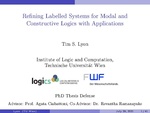Refining Labelled Systems for Modal and Constructive Logics with Applications
From International Center for Computational Logic
Tim Lyon
Refining Labelled Systems for Modal and Constructive Logics with Applications
Phd thesis, Technische Universität Wien, 2021/07/29
Refining Labelled Systems for Modal and Constructive Logics with Applications
Phd thesis, Technische Universität Wien, 2021/07/29
- KurzfassungAbstract
This thesis introduces the method of structural refinement (that will be referred to more simply as refinement), which serves as a means of transforming the relational (Kripke) semantics of a modal and/or constructive logic into an ‘economical’ proof system by connecting two proof-theoretic paradigms: labelled sequent and nested sequent calculi. The formalism of labelled sequents has been successful in that cut-free calculi in possession of desirable proof-theoretic properties (e.g. admissibility of structural rules, invertibility of rules, etc.) can be automatically generated for large classes of logics. Despite these qualities, labelled systems make use of a complicated syntax that explicitly incorporates the semantics of the associated logic, and such systems typically violate the subformula property to a high degree. By contrast, nested sequent calculi employ a simpler syntax and adhere to a strict reading of the subformula property, making such systems useful in the design of automated reasoning algorithms. However, the downside of the nested sequent paradigm is that a general theory concerning the automated construction of such calculi (as in the labelled setting) is essentially absent, meaning that the construction of nested systems and the confirmation of their properties is usually done on a case-by-case basis. The refinement method connects both paradigms in a fruitful way, by transforming labelled systems into nested (or, refined labelled) systems with the properties of the former preserved throughout the transformation process. The qualities of nested and refined labelled systems makes them easier to work with, can lead to a savings in space, and can bring about an increased efficiency in automating and solving reasoning tasks (e.g. proof-search, effective interpolation, etc.). To demonstrate the method of refinement and some of its applications, we consider a varied group of modal and constructive logics: context-free grammar logics with converse, first-order intuitionistic logics, and deontic STIT logics. The introduced refined labelled calculi will be used to provide the first proof-search and automated counter-model extraction algorithms for deontic STIT logics, thus yielding decision procedures for the logics. Furthermore, we employ our refined labelled calculi for context-free grammar logics with converse to show that every logic in the class possesses the effective Lyndon interpolation property. In order to carry out this result, we make use of a syntactic, proof-theoretic method of Lyndon interpolation. - Weitere Informationen unter:Further Information: Link
- Forschungsgruppe:Research Group: Computational LogicComputational Logic
@phdthesis{L2021,
author = {Tim Lyon},
title = {Refining Labelled Systems for Modal and Constructive Logics with
Applications},
school = {Technische Universit{\"{a}}t Wien},
year = {2021}
}
